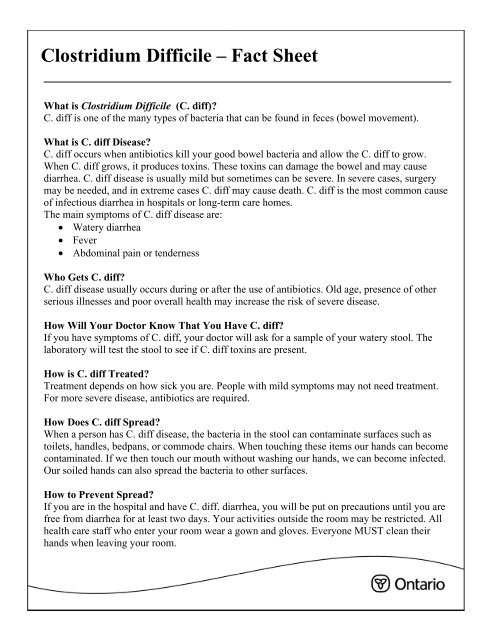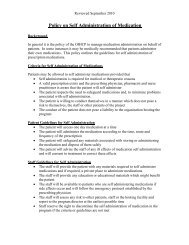Clostridium Difficile – Fact Sheet
C Diff factsheet - Ottawa Inner City Health Inc.
C Diff factsheet - Ottawa Inner City Health Inc.
You also want an ePaper? Increase the reach of your titles
YUMPU automatically turns print PDFs into web optimized ePapers that Google loves.
<strong>Clostridium</strong> <strong>Difficile</strong> <strong>–</strong> <strong>Fact</strong> <strong>Sheet</strong><br />
What is <strong>Clostridium</strong> <strong>Difficile</strong> (C. diff)?<br />
C. diff is one of the many types of bacteria that can be found in feces (bowel movement).<br />
What is C. diff Disease?<br />
C. diff occurs when antibiotics kill your good bowel bacteria and allow the C. diff to grow.<br />
When C. diff grows, it produces toxins. These toxins can damage the bowel and may cause<br />
diarrhea. C. diff disease is usually mild but sometimes can be severe. In severe cases, surgery<br />
may be needed, and in extreme cases C. diff may cause death. C. diff is the most common cause<br />
of infectious diarrhea in hospitals or long-term care homes.<br />
The main symptoms of C. diff disease are:<br />
Watery diarrhea<br />
Fever<br />
Abdominal pain or tenderness<br />
Who Gets C. diff?<br />
C. diff disease usually occurs during or after the use of antibiotics. Old age, presence of other<br />
serious illnesses and poor overall health may increase the risk of severe disease.<br />
How Will Your Doctor Know That You Have C. diff?<br />
If you have symptoms of C. diff, your doctor will ask for a sample of your watery stool. The<br />
laboratory will test the stool to see if C. diff toxins are present.<br />
How is C. diff Treated?<br />
Treatment depends on how sick you are. People with mild symptoms may not need treatment.<br />
For more severe disease, antibiotics are required.<br />
How Does C. diff Spread?<br />
When a person has C. diff disease, the bacteria in the stool can contaminate surfaces such as<br />
toilets, handles, bedpans, or commode chairs. When touching these items our hands can become<br />
contaminated. If we then touch our mouth without washing our hands, we can become infected.<br />
Our soiled hands can also spread the bacteria to other surfaces.<br />
How to Prevent Spread?<br />
If you are in the hospital and have C. diff. diarrhea, you will be put on precautions until you are<br />
free from diarrhea for at least two days. Your activities outside the room may be restricted. All<br />
health care staff who enter your room wear a gown and gloves. Everyone MUST clean their<br />
hands when leaving your room.
Always wash your hands after using the bathroom. Cleaning hands is the most important way<br />
for everyone to prevent the spread of C. diff. As well, a thorough cleaning of your room and<br />
equipment will be done to prevent spread of the infection.<br />
What Should I Do at Home?<br />
Healthy people like your family and friends who are not taking antibiotics are at very low risk of<br />
getting C. diff disease.<br />
Hand hygiene<br />
Wash your hands for at least 15 seconds:<br />
After using the toilet<br />
After touching dirty surfaces<br />
Before eating<br />
Before preparing meals<br />
Cleaning the house<br />
Use an all purpose household cleaner. Follow the directions on the label, and:<br />
Wet the surface well and clean using good friction<br />
Allow the surface to air dry<br />
Pay special attention to areas that may be soiled with feces such as the toilet and<br />
sink. Remove any visible feces, and then clean as described above<br />
Cleaning clothes/other fabric<br />
Wash clothes/fabric separately if they are heavily soiled with feces:<br />
Rinse off feces<br />
Clean in a hot water cycle with soap<br />
Dry items in the dryer on high heat, if possible<br />
Dry clean where appropriate<br />
Cleaning dishes<br />
Regular cleaning <strong>–</strong> use the dishwasher or clean by hand with soap and water.<br />
It is very important that you take all your medication as prescribed by your doctor. You should<br />
not use any drugs from the drugstore that will stop your diarrhea (e.g. Imodium). If diarrhea<br />
persists or comes back, contact your doctor.<br />
For more information on <strong>Clostridium</strong> difficile, visit http://www.health.gov.on.ca<br />
November, 2006




